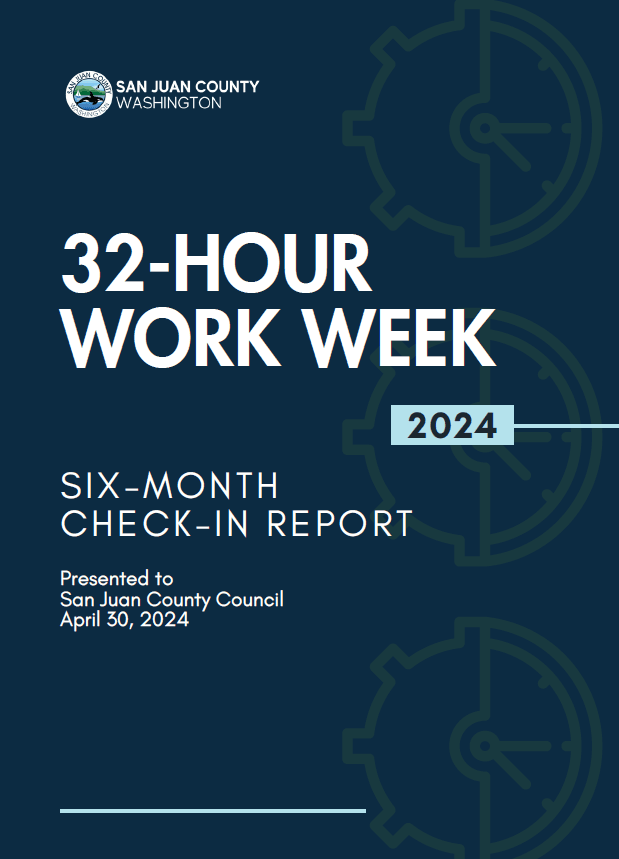San Juan County Publishes Six-Month Check-in Report for the 32-Hour Work Week
SAN JUAN COUNTY, WA April 30, 2024 – San Juan County and representatives from the Local 1849 Union are pleased to present a comprehensive review of the 32-hour work week (32HWW) initiative at the first six-month check-in.
In the fall of 2023, the 32HWW was adopted to support the County in maintaining fiscal health in the face of rising wage and inflation pressure, improving employee recruitment and retention to strengthen the workforce, and prioritizing the well-being of islanders.
“We’re encouraged by the initial results of the 32-hour work week check-in,” said the County’s Interim County Manager Mark Tompkins. “However, we know that more data and more time with the schedule will be vital to understanding its true impacts on the organization. Six months is really just a drop in the bucket, and I look forward to seeing what the one-year and two-year check-ins will reveal.”
Six-Month Findings
The three-year labor contract calls for regular check-ins at the six-month, one-year, and two-year marks. The County hosted a series of internal surveys, meetings, and interviews to collect data about the impacts of the 32HWW. Survey results and department findings are compiled into a comprehensive report available on the County’s Engage website. The results lay the groundwork for making systematic improvements as the County moves forward with the new schedule.
The report features key findings in four main areas: Fiscal Health, Employee Recruitment and Retention, Islander Wellness, and Evaluating County Operations. Highlights include:
Fiscal Health: During negotiations for the 2023-2025 labor contract, Union representatives requested increased cost-of-living adjustments and additional benefits that reflected the period of hyper-inflation that occurred beginning in the pandemic. The County calculates that Union-requested increases at a 40-hour work week would have amounted to an unsustainable budget difference of approximately $975,000 more than the 32HWW budget in 2024. The County continues to carefully analyze the financial implications of the 32HWW and develop other strategies to maintain fiscal health.
Recruitment and Retention: Since the implementation of the 32HWW, interest in County employment has dramatically increased. The number of applicants has spiked and the time it takes to fill positions has dropped by 62%. Data from the Department of Human Resources shows voluntary separations (quitting, retiring) have decreased by 46% between Q1 of 2023 vs Q1 of 2024, allowing the County to retain a skilled workforce.
Islander Wellness: San Juan County employees are generally supportive of the 32HWW, mentioning the positive impacts on their mental health and stress levels, the ability to spend time with family and children, and improved energy levels and physical health in survey responses. Even during respiratory illness season, employee timesheet data showed that employees used an average of 31% less sick time than before the 32HWW. See the full survey in Appendix II of the report.
Evaluating County Operations: Since implementing the 32HWW, the County has experienced little variation in its ability to deliver key programs and services. No staff positions or programs have been cut and public services are being maintained. Many departments continue their ‘on-call’ services and respond to after-hours needs. A list of department-specific key performance indicators is located in Appendix I of the report.
Evaluating County Operations: Employee timesheets show that a 20% reduction in hours for full-time employees (1.0 FTE) did not necessarily equate to 20% less hours worked across the organization. In fact, employee hours worked only dropped by an average of 8%, thanks to fewer vacancies and the continuous support of part-time staff whose hours were unchanged. The County will continue to monitor the total number of hours worked across the organization at the one-year and two-year milestones.
Challenges
As one of the first Counties to adopt a 32HWW, there were few precedents to follow, and every department and office was met with its own set of challenges, including:
- Adjusting to the new schedule (setting new office hours if needed, balancing employee schedules, coordinating with partner agencies and/or other departments)
- Re-organizing priorities (reviewing yearly goals, re-evaluating staff training needs)
- Sustaining front-desk / phone coverage (aligning staff schedules with customer service needs)
- Maintaining productivity (identifying key deliverables, focusing on efficiency)
The transition to a 32HWW demands creative problem-solving, flexibility, and collaboration across the organization to address obstacles and maintain efficiencies. The County will continue to work toward solutions and adapt strategies based off the findings from this, and every other, check-in through 2025.
What’s Next?
A ‘six-month check-in’ serves as a valuable interim assessment point, offering an opportunity to gauge progress, address any immediate concerns, and course-correct if necessary. The County also recognizes there’s much more to learn and improve upon.
That’s why the organization is working toward a final report at the two-year milestone. Over the course of two years, the 32HWW will be observed across multiple budget and project cycles, various seasonal workflows, new procedures, and staffing changes to more comprehensively understand its efficacy and sustainability.
In the meantime, the County will focus on increased communication, employee training and skills development, and establishing a team to integrate report findings into County operations.
By diligently monitoring the impacts of the new schedule, the County will adapt its strategies, address challenges, and optimize the benefits of the 32HWW.
Visit the Engage website: 32-Hour Work Week | Engage San Juan County (sanjuancountywa.gov)
View and/or download the 6-month report: https://engage.sanjuancountywa.gov/20872/widgets/81869/documents/54512
Questions? Contact: 32hours@sanjuancountywa.gov







